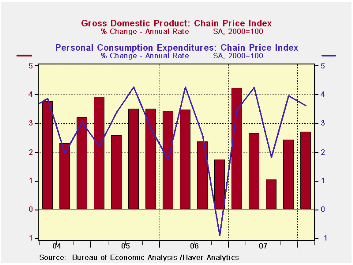 Global| Jun 26 2008
Global| Jun 26 2008U.S. 1Q'08 GDP Revised Up Minimally, Profits Revised Down
by:Tom Moeller
|in:Economy in Brief
Summary
U.S. real GDP growth during 1Q'08 was revised minimally higher and showed 1.0% growth after the 0.6% rise during 4Q '07. Still, together, the figures are the weakest since near the end of the recession year of 2001. Corporate profits [...]

U.S. real GDP growth during 1Q'08 was revised minimally higher and showed 1.0% growth after the 0.6% rise during 4Q '07. Still, together, the figures are the weakest since near the end of the recession year of 2001.
Corporate profits were revised down considerably to a 1.3% annual rate of decline (+1.0% y/y) after the initial estimate of a 1.3% (1.7% y/y) rise. That followed the decline at a 12.4% rate in 4Q and at a 4.9% rate in 3Q. Lower earnings in foreign sector earnings, which now are estimated to have declined at a 21.1% rate (+25.5% y/y), contrasted with the initial estimate of 5.1% growth.Earnings in the financial sector were revised up to a 14.4% (-8.5% y/y) rate of increase following sharp declines during the prior two quarters. U.S. nonfinancial sector earnings were minimally revised to a 1.8% (-2.6% y/y) rate of increase after two quarters of sharp decline. In the GDP accounts, revisions to trade and inventories were minimal. An improved foreign trade deficit added an unrevised 0.8 percentage points to GDP growth as growth in exports was raised to 5.5% (9.5% y/y) but so too were imports which now are estimated to have declined at only a 0.7% rate (-0.1% y/y).Inventory accumulation is now estimated to have added nothing to 1Q GDP growth, down from the last reading of a 0.2 point addition. That contrasted with a 1.8 point subtraction from growth during 4Q '07.
Growth in final sales to domestic purchasers was revised up to a minimal 0.1% increase after a 1.3% rise during 4Q. These figures are weakest readings since the earlier recession in 1991.
The decline in residential construction was still quite severe. Activity declined at a little revised 24.5% (-20.7% y/y) rate which was about equal to the drops in 4Q and 3Q. These are the quickest rates of decline since the recession in 1981 and the 1Q drop reduced overall real GDP growth by 1.2 percentage points. Business fixed investment was revised up slightly to a 0.5% (+6.7% Y/Y) rate of increase. It still was the smallest rate of increase since early 2004. Investment in structures grew at a little revised 1.3% (13.7% y/y) rate while equipment investment rose at a 0.2% (+3.5% y/y) rate rather than declining slightly.Growth in real personal consumption was little revised at a 1.1% (1.9% y/y) gain which was its weakest since the recession year of 2001. Spending on autos & light trucks fell at a 13.4% (-4.8% y/y) rate while spending on furniture & other household equipment rose at a still weak 1.0% (5.1% y/y) rate. Growth in real PCE added 0.8 percentage points to 1Q real GDP growth.
The GDP chain price index was revised up slightly to a 2.7% annual rate of growth which was its fastest gain in three quarters. The PCE price index rose at a 3.6% rate (3.4% y/y) which was down slightly from the 3.9% rise in 4Q. Less food & energy consumer prices rose at a 2.3% rate which was revised up slightly.
| Chained 2000$, % AR | 1Q '08 (Final) | 1Q '08 (Preliminary) | 1Q '08 (Advance) | 4Q '07 | 3Q '07 | 1Q Y/Y | 2007 | 2006 | 2005 |
|---|---|---|---|---|---|---|---|---|---|
| GDP | 1.0 | 0.9 | 0.6 | 0.6 | 4.9 | 2.5 | 2.2 | 2.9 | 3.1 |
| Inventory Effect | 0.0 | 0.2 | 0.8 | -1.8 | 0.9 | 0.1 | -0.3 | 0.1 | -0.2 |
| Final Sales | 0.9 | 0.7 | -0.2 | 2.4 | 4.0 | 2.7 | 2.5 | 2.8 | 3.3 |
| Foreign Trade Effect | 0.8 | 0.8 | 0.2 | 1.0 | 1.4 | 1.0 | 0.7 | -0.1 | -0.2 |
| Domestic Final Demand | 0.1 | -0.1 | -0.4 | 1.3 | 2.5 | 1.4 | 1.8 | 2.7 | 3.3 |
| Chained GDP Price Index | 2.7 | 2.6 | 2.6 | 2.4 | 1.0 | 2.2 | 2.7 | 3.2 | 3.2 |
Tom Moeller
AuthorMore in Author Profile »Prior to joining Haver Analytics in 2000, Mr. Moeller worked as the Economist at Chancellor Capital Management from 1985 to 1999. There, he developed comprehensive economic forecasts and interpreted economic data for equity and fixed income portfolio managers. Also at Chancellor, Mr. Moeller worked as an equity analyst and was responsible for researching and rating companies in the economically sensitive automobile and housing industries for investment in Chancellor’s equity portfolio. Prior to joining Chancellor, Mr. Moeller was an Economist at Citibank from 1979 to 1984. He also analyzed pricing behavior in the metals industry for the Council on Wage and Price Stability in Washington, D.C. In 1999, Mr. Moeller received the award for most accurate forecast from the Forecasters' Club of New York. From 1990 to 1992 he was President of the New York Association for Business Economists. Mr. Moeller earned an M.B.A. in Finance from Fordham University, where he graduated in 1987. He holds a Bachelor of Arts in Economics from George Washington University.
More Economy in Brief
 Global| Feb 05 2026
Global| Feb 05 2026Charts of the Week: Balanced Policy, Resilient Data and AI Narratives
by:Andrew Cates






